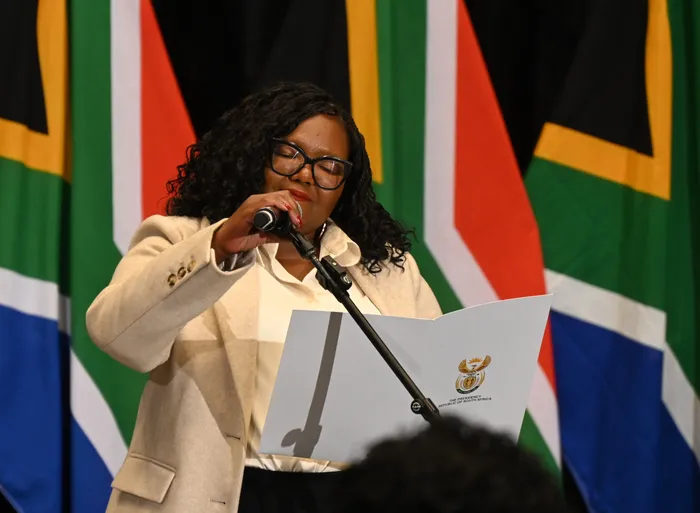
Basic Education Minister Siviwe Gwarube maintains that matriculants are not required to obtain a 30% pass but were required to obtain a 40% pass in four subjects and 30% in three other subjects.
Image: Ayanda Ndamane
Basic Education Minister Siviwe Gwarube and Build One South Africa leader Mmusi Maimane squared off against each other over the pass rate in matric with the former insisting on the need to strengthen the foundation phase, rather than an obsessing over the outcomes in the final school year.
This played out during a question and answer session in the National Assembly when Maimane asked when Gwarube envisaged establishing the consultative forum she promised last year to undertake a fundamental review of the school curriculum, including reforming the 30% pass mark.
The question was on revising the so-called 30% pass rate in matric - Maimane's party has been championing this issue, saying the current pass rate is not a true reflection of the actual results.
It was the first time the once-colleagues in the DA had sparred on the matter face-to-face - previous interactions had been in press conferences and written parliamentary questions and answers.
In her response, Gwarube said matriculants are not required to obtain 30% pass but were required to obtain 40% pass in four subjects and 30% pass in three other subjects.
“The biggest injustice of the whole narrative around the 30% pass rate is that 724,000 learners who sat for exams last year and wrote exams, only 189 of them passed with the minimum requirement. That represents 0,000% of learners who pass by this minimum requirement. It is important that we don’t paint this as one simple brush,” he said.
Gwarube also said the envisaged council to be established would be a consultative body.
“This would be an advisory council to the minister, particularly on issues relating to curriculum reform. The issue of the nomination closed at end of January and I will make the announcement about the members of the council in the coming weeks, once these have served in Cabinet,” she said.
Gwarube also said education reform will not come, whether or not learners pass by 30% in matric.
“Education reform has to be looked at systematically. We need to strengthen the foundation of learning. We need to look at the entire schooling system and make sure that children from (grade) zero all the way to 10 years old are able to read for meaning, are able to count, and develop cognitively,” she said.
But, Maimane described Gwarube as becoming a convert of those that deem that the 30% pass rate did not exist.
“Yet, the Democratic Alliance says that the real pass rate is at 50%. You are arguing it is higher,” he said.
Maimane also said in the recent matric results, 251,488 candidates wrote mathematics only 30% of them achieved 50% or more, and the trend in Physical Science was worse
“As per the 2014 panel review, it stated we need to review promotion standards. In thinking about the world of work in future, the ambitions South Africa has, are you willing to adjust at least how learners are assessed in math, science and technology and ensuring we improve the pass marks there. If that does not happen, will you take accountability for these issues as a departure from the past that we have to see?” asked Maimane.
Gwarube said it would be myopic to be looking at just the issue of a 30% pass rate.
“I’m saying when we talk about quality, we have to look at the system entirely.”
She agreed with Maimane’s concerns around the pass rate in math and science subjects.
“Yes, there is a drop in the uptake and performance of math= and science. It goes to the point I was making. If we focus around matric and the matric pass rate, we are missing the point, honourable member.
“We need to develop the system in its entirety from literally the foundation all the way to matric because we are going to be under pressure to engineer results, trying to pressurise students to take up math and science and make sure if we change assessments, we are sure that they are ready when they enter school,” she said.
Gwarube added that the national council on education will look at the issue.
“We can’t just look at one issue in entirety in isolation when we talk about the quality and standards in our country in education. We have to look at the (entire) system.”
mayibongwe.maqhina@inl.co.za
Related Topics:
